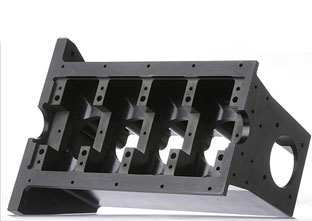
What about weight under the hood?
Featuring ultra-lightweight chassis
Under the auspices of ZF Friedrichshafen AG, several project partners from research and the industry are currently working on an active lightweight chassis made of fibre composite plastic materials.
Featuring comparable driving dynamics, safety and comfort characteristics, this chassis will weigh significantly less and can possibly be produced economically in large scales.
With such a leap in development, the project partners can make a contribution to the reduction of fuel consumption and CO2 emissions.

why not a plastic engine ?
 Matti Holtzberg, a New Jersey engineer who has spent 30 years working on composite-plastic engines, hopes to become its final implementer.
Matti Holtzberg, a New Jersey engineer who has spent 30 years working on composite-plastic engines, hopes to become its final implementer.
The name of his company: Polimotor Research (for polymer motor), sums up his program. His patents cover polymer formulations and techniques for casting resin reinforced with fibreglass in the most common type of moulds.
They must be interesting enough since he formed a strategic partnership with Huntsman, a global chemical company which has been a regular supplier for the auto industry for decades.
Holtzberg had many arguments to convince Huntsman’s CEO: his first polymer motor dates back to the 1980s.
 It equipped a 2.3-liter Ford Pinto and Holtzberg had made the engine block, cylinder head, piston skirts, oil pan and connecting rods out of plastics. His 2nd generation engine developed 300-horsepower, whilst weighing hardly 70 kilos. When compared to its steel counterpart, (88 horsepower for 188 kilos weight), one can count the benefits in cash as well as in fuel and CO2 savings.
It equipped a 2.3-liter Ford Pinto and Holtzberg had made the engine block, cylinder head, piston skirts, oil pan and connecting rods out of plastics. His 2nd generation engine developed 300-horsepower, whilst weighing hardly 70 kilos. When compared to its steel counterpart, (88 horsepower for 188 kilos weight), one can count the benefits in cash as well as in fuel and CO2 savings.
The 21st century has seen the reinforcement of a trend which started in the 1980s, fuelled by the increasing price of oil and the raising of environmental awareness.
As a consequence, car manufacturers all around the world try to build lighter cars and the methods to do it goes from downsizing, subtracting unnecessary components and use of lightweight alloys and carbon fibre for structural bits.
Most researchers had left the engine untouched: so far, major power train structural components — engine blocks and cylinder heads, transmission cases and axle housings — are made of iron or aluminium castings because they were supposedly the only materials able to endure the heat and stress in their line of work.
With the help of Huntsman, Holtzberg hopes to develop THE plastic tough enough to withstand the harsh conditions inside engines and which would trim an aluminium engine’s weight by 30 percent to 35 percent. Whether the fuel is oil or electricity, the motto in car manufacturing will always be “the lighter the cars, the better”.

F1 Brazilian GP Trophies Made From Trash
 Continuing with last year's trend, the trophies awarded this year to the podium finishers at the Brazilian GP were made of recycled materials. Last year's trophy, designed by Oscar Niemeyer, was constructed of 100 percent recycled plastic.
Continuing with last year's trend, the trophies awarded this year to the podium finishers at the Brazilian GP were made of recycled materials. Last year's trophy, designed by Oscar Niemeyer, was constructed of 100 percent recycled plastic.
This year, the trophy was still made of recycled materials but coming from the approximately 60 tons of trash that accumulated during the Grand Prix weekend at Interlagos, the venue of the Brazilian Grand Prix on October 18th.
The trophies were completed around three hours prior to the race.
MORE INFORMATION
www.zf.com
www.huntsman.com
Photo Brazilian GP :
Mark Thompson/Getty Images





